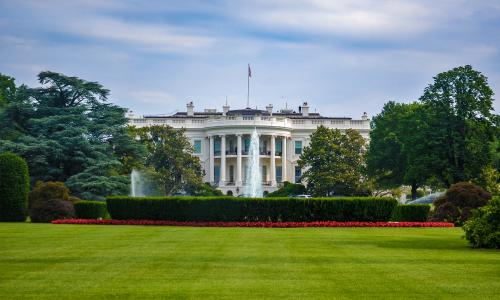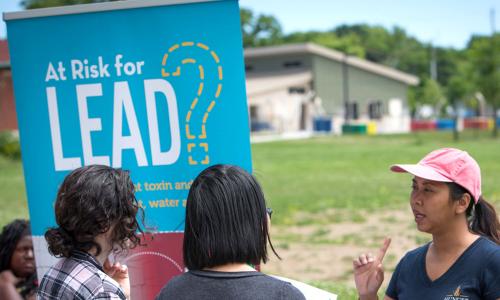Throughout our nation’s history, the safety and health of the public have depended on the government’s commitment to and use of science. This is for good reason: the scientific process remains humanity’s best tool for understanding the natural world.
While agencies have implemented policies to protect scientific integrity, weaknesses remain, and the Trump administration’s unprecedented attacks on science have made these weaknesses starkly visible.
Therefore, the next president must show leadership by taking concrete actions to strengthen scientific integrity in government and to ensure that science informs decisions that affect our health, safety, and environment.
This checklist recommends important actions the next president can take to restore, protect, and advance the role of science in government decisionmaking. For more detailed information and further recommendations, read our full report Presidential Recommendations for 2020.
Promoting science-based decision-making
The president should restore the voices of scientific experts, independent scholars, and communities in policymaking.
- Issue an executive order requiring that all science agencies have chief science officers.
- Commit to filling open science positions in accordance with the limits set forth by the Vacancy Reform Act.
- Ensure that all budget requests submitted to Congress ask for enough full-time equivalent positions to effectively conduct the scientific work at each agency.
- Rescind the Executive Order on Evaluating and Improving the Utility of Federal Advisory Committees, which requires federal agencies to disband 1/3 of their committees.
- Strengthen 1994’s Executive Order 12898, Federal Actions to Address Environmental Justice in Minority Populations and Low-Income Populations.
Strengthening scientific integrity
The president should direct agencies and the Office of Science and Technology Policy (OSTP) to bolster efforts that promote scientific integrity and science-based decision-making.
- Direct each agency head to appoint or assign an official to oversee scientific integrity.
- Direct agency heads to review, and as needed improve, existing scientific integrity policies.
- Create clearance procedures that are clear, consistent, transparent, and predictable.
Enforcing transparency
The president should take steps to ensure the public availability of government research and to improve public access through open-records laws.
- Direct OSTP to continue implementing Executive Order 13642 on open data at agencies.
- Direct the President’s Council of Advisors on Science and Technology (PCAST) to stay abreast of and provide recommendations regarding the administration’s progress on scientific integrity on an ongoing basis.
- Scientific integrity officials should issue annual public reports on the status of allegations and investigations relating to violations of the agency’s scientific integrity policy, while keeping confidential the names of those involved as appropriate.
- Ensure that scientific information and data on government websites is not politically censored.
- Affirm that the default position of the administration regarding the Freedom of Information Act is the presumption of openness and proactive disclosure.
- Direct agencies to use improved technology to streamline the FOIA process.
- Direct the Chief Technology Officer of the United States to enhance digital archived repositories of scientific information.
Addressing conflicts of interest
The president should support efforts to define and curb conflicts of interest, establish baseline qualifications for nominees, and strengthen requirements in disclosing conflicts of interest.
- Ensure that all federal officials have access to the best scientific advice from the very start of the next administration.
- Appoint a widely respected scientist to the position of science advisor to the president and nominate the same person to direct the OSTP.
- Require OSTP to direct agencies to develop clear guidance for using peer review in scientific assessments and ensure that agencies apply the guidance consistently.
- Instruct the Office of Government Ethics (OGE) to provide clear guidelines about conflicts of interest on federal advisory committees and agency peer review.
- Work with federal agencies to improve conflict-of-interest policies for political appointees.
- The president should appoint scientific leadership positions from among individuals with specialized training or significant experience relevant to the agency position for which they are being nominated.
Safeguarding pathways for government scientists
The next president must work to restore protections for government scientists, solidify safeguards for whistleblowers, and ensure that work environments across federal agencies support and celebrate scientists’ critical efforts.
- Support congressional efforts to expand the Whistleblower Protection Enhancement Act (WPEA).
- Direct agency heads to communicate to all agency employees a personal commitment to scientific integrity and the protection of whistleblowers, encourage them to report losses of scientific integrity, and provide information about anti-censorship and anti-retaliation rights under federal laws.
- Ensure that the OMB does not interfere in the scientific work of agencies and should support congressional efforts to codify that in legislation.
Fostering public participation
The president should take actions that encourage diverse, widespread, and fair participation in the rulemaking process.
- Encourage research into effective strategies for public engagement.
- Direct agencies to enhance digital accessibility in the rulemaking process.
- Promote efforts to increase transparency and equity in rulemaking.
- Direct agencies to solicit public input in the rulemaking process sooner and more effectively.
Protecting democratic processes
The president should safeguard the fundamental processes of a healthy democracy, free of outsized moneyed influence.
- Support congressional efforts to pass, and sign into law, voting rights reforms such as the For the People Act, the Voting Rights Advancement Act, and the Fair Representation Act.
- Support efforts to amplify small-donor campaign financing.
- Back proposals to crack down on dark money and enforce existing campaign finance laws.
- Empower the FEC to reign in violations of campaign finance laws and strengthen the integrity of elections to federal offices.
- Issue an executive order requiring companies with government contracts to disclose their political contributions.
- Direct the FEC to reform its digital regulatory regime and revamp its enforcement mechanisms.
- Direct the Internal Revenue Service (IRS) to initiate reforms that prevent “dark money” groups from bypassing rules on disclosing campaign contributions.
- Direct the Securities and Exchange Commission (SEC) to strengthen its regulatory oversight of political expenditures.
Conclusion
The Trump administration’s unprecedented attacks on science highlight an urgent need for the next president to restore integrity in science-based decisionmaking. This administration has sidelined scientific guidance from experts inside and outside of agencies, directly censored scientists, suppressed federal scientific reports, and created a chilling environment that has demoralized federal scientists and led to self-censorship of their work.
The consequences of sidelining science for the past four years will only intensify if future leaders do not restore the role of independent science and expertise in decision-making. Failing to do so risks increased pollution in our communities, less preparation for and response to national emergencies and disasters, unsafe conditions and exposures in our workplaces, dangerous products in our homes, and lives that will impaired, shortened, or lost. Our next leader must take swift action to make science a centerpiece of our health, safety, and security protections.




